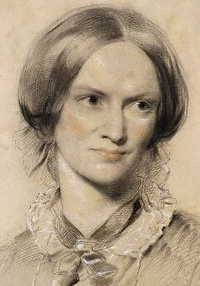Last words are a person's final words spoken before death.
Contents
Last Words may also refer to:
Last words are a person's final words spoken before death.
Last Words may also refer to:

The cut-up technique is an aleatory narrative technique in which a written text is cut up and rearranged to create a new text. The concept can be traced to the Dadaists of the 1920s, but it was developed and popularized in the 1950s and early 1960s, especially by writer William S. Burroughs. It has since been used in a wide variety of contexts.

Charlotte Nicholls, commonly known as Charlotte Brontë, was an English novelist and poet, the eldest of the three Brontë sisters who survived into adulthood and whose novels became classics of English literature. She is best known for her novel Jane Eyre, which she published under the male pseudonym Currer Bell. Jane Eyre went on to become a success in publication, and is widely held in high regard in the gothic fiction genre of literature.

Emily Jane Brontë was an English novelist and poet who is best known for her only novel, Wuthering Heights, now considered a classic of English literature. She also published a book of poetry with her sisters Charlotte and Anne titled Poems by Currer, Ellis and Acton Bell with her own poems finding regard as poetic genius. Emily was the second-youngest of the four surviving Brontë siblings, between the youngest Anne and her brother Branwell. She published under the pen name Ellis Bell.

William Seward Burroughs II was an American writer and visual artist. He is widely considered a primary figure of the Beat Generation and a major postmodern author who influenced popular culture and literature. Burroughs wrote eighteen novels and novellas, six collections of short stories and four collections of essays, and five books have been published of his interviews and correspondences; he was initially briefly known by the pen name William Lee. He also collaborated on projects and recordings with numerous performers and musicians, made many appearances in films, and created and exhibited thousands of visual artworks, including his celebrated "shotgun art".
Line most often refers to:

The Brontës were a nineteenth-century literary family, born in the village of Thornton and later associated with the village of Haworth in the West Riding of Yorkshire, England. The sisters, Charlotte (1816–1855), Emily (1818–1848) and Anne (1820–1849), are well-known poets and novelists. Like many contemporary female writers, they published their poems and novels under male pseudonyms: Currer, Ellis, and Acton Bell. Their stories attracted attention for their passion and originality immediately following their publication. Charlotte's Jane Eyre was the first to know success, while Emily's Wuthering Heights, Anne's The Tenant of Wildfell Hall and other works were accepted as masterpieces of literature after their deaths.
Passion, the Passion or the Passions may refer to:
A mirror is an object whose surface reflects an image.
A witch is a practitioner of witchcraft.
Wuthering Heights is an 1847 novel by Emily Brontë.
The Bridge may refer to:
The Word may refer to:

The Brontë Sisters is a 1979 French biographical drama film directed by André Téchiné, who co-wrote the screenplay with Pascal Bonitzer and Jean Gruault. The film stars Isabelle Adjani, Marie-France Pisier and Isabelle Huppert as the Brontë sisters. The cinematography was by Bruno Nuytten. It was a project that Téchiné wanted to make since 1972, but only after the favourable reception of Souvenirs d'en France (1975) and Barocco (1976), he was able to find the necessary financing. Produced by Gaumont, the film's originally running time was cut from three to less than two hours upon its release at the 1979 Cannes Film Festival.
The Last Word or Last Word may refer to:

"A Death-Scene" is a poem by English writer Emily Brontë. It was written on 2 December 1844 and published in 1846 in a book collecting poetry by Brontë and her siblings.

F. De Samara to A. G. A. is a poem by British author and poet Emily Jane Brontë, written on November 1, 1838.
A confession is an acknowledgement of fact by one who would have otherwise preferred to keep that fact hidden.
Ariel may refer to:

To Walk Invisible is a British television film about the Brontë family that aired on BBC One on 29 December 2016. The drama was written and directed by Sally Wainwright and focused on the relationship of the three Brontë sisters; Charlotte, Emily and Anne, and their brother, Branwell.